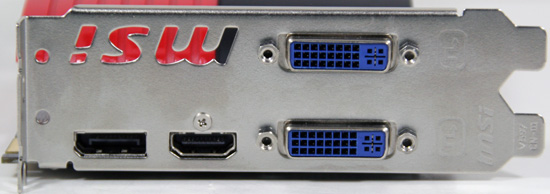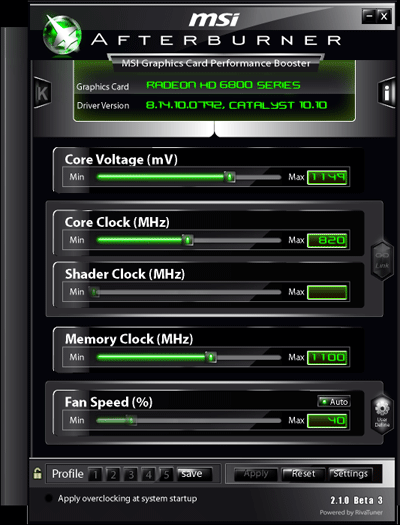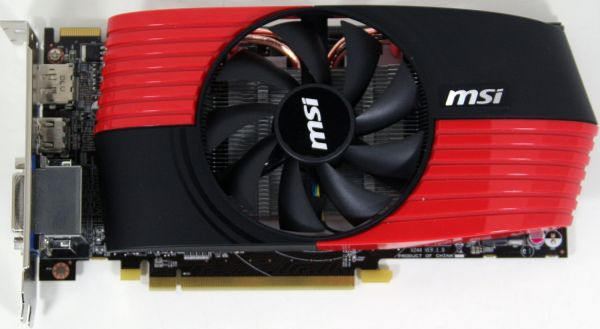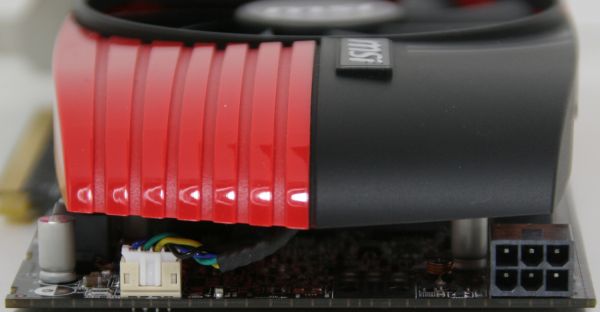AMD Radeon HD 6850 Overclocking Roundup: Asus, XFX, & MSI
by Ryan Smith on November 8, 2010 12:40 AM ESTMeet The MSI R6850 OC
The final card in today’s roundup is MSI’s R6850 OC. The R6850 OC is one of the first 6850s being released with a significant overclock, with MSI releasing it at 820MHz core and 1100MHz (4400MHz effective) memory, a 45MHz (5.8%) core and 100MHz (10%) memory overclock respectively. Besides the overclock, the card is identical to MSI’s existing R6850, using the same PCB and cooler as its stock-clocked counterpart.
Starting with the PCB, MSI is also using a non-reference PCB, this time using a shorter 8.5” PCB. In fact it's the same PCB as on the XFX card, leading us to believe that this is an alternative 1x DisplayPort PCB from AMD. In any case, because it's the same PCB as the XFX it means it's sharing the same design flaws: MSI has kept the PCIe power sockets on the rear of the card, so the practical length of the card is longer. Furthermore in the case of the MSI card, the card’s plastic shroud hangs over the end of the card, making the card 9” long in practice. As a result the end-user benefits of the shorter PCB are more or less wasted.
Attached to the PCB is MSI’s cooler, which bears a striking resemblance to Asus’s DirectCU cooler. Here MSI is using a pair of copper heatpipes to transfer heat from the baseplate to an aluminum heatsink that runs most of the length of the card. In the center is an 80mm fan providing airflow for cooling, and on top of that a shroud to direct airflow out of the front and the back of the card. Compared to the Asus DirectCU cooler, the biggest differences are that MSI is using a larger fan and copper heatpipes in place of aluminum heatpipes.
As for the port configuration, MSI is using the same configuration as both XFX and Asus: two DVI ports, one HDMI port, and one full-size DisplayPort, meaning the card can drive up to 5 monitors with a DP hub.

For the R6850, MSI’s ace in the hole is the software rather than the hardware. The R6850 comes with MSI’s fantastic Afterburner software, which comes with allows overclocking and monitoring, and on the R6850 it even allows voltage modification. While MSI makes this software available for use on non-MSI cards, we always make it a point to tip our hat in their direction as Afterburner continues to be the gold standard in overclocking software.

Rounding out the package is the usual collection of odds & ends: a quick-start manual, driver/utility CD, molex-to-PCIe power adaptor, a long CrossFire bridge, and a DVI-to-VGA dongle. Unfortunately we don’t have pricing information for the R6850 OC at this time, but we’ve already seeing the stock-clocked version at around $190, so we’d expect the R6850 OC to go for around $200, a $20 markup over the AMD MSRP for a reference card and roughly in-line with other factory overclocked cards. Meanwhile on the support side of matters, MSI is providing a 3 year warranty with the card.


















93 Comments
View All Comments
tech6 - Monday, November 8, 2010 - link
Nice work Ryan.Let's all turn it down a notch about the 460 OC cards. This was never an issue and it still isn't. A number of available cards are chosen for comparison purposes but you can never include all possible variations. So those that are seeing some sort of conspiracy that has Anand taking bags of cash from a vendor in return for leaving out some card in his comparisons - it's time to take off you foil hats and come out from your basements. AT is an excellent and thorough tech review site and to throw out unsubstantiated charges of bias is just a cheap shot. If you have some sort of persuasive proof to contrary then please share it with the rest of us.
silverblue - Monday, November 8, 2010 - link
...it may be better to just compare the 6870 and its OCed variants to the best 460s around in a separate article. It's obvious (at least, to me) that in terms of performance, the OCed 6850s cannot match the 460 FTW and that the true competition would be the OCed 6870. In terms of power and temperature, the 6850 will win, but that's not of much concern when people want the fastest card.Veroxious - Monday, November 8, 2010 - link
Well I guess it's a case of damned if you do and damned if you don't..... IMO you should have included the superclocked EVGA GTX460 (focusing the article on OC results) as it would then be an apples to apples comparison. If one does refer back to the 6850/6870 article you will see that the 2 best overclocking cards (Asus and more so MSI) are neck and neck with the EVGA GTX460 FTW. So buying any of these cards would be an excellent buy.The DIFFERENCE is while the EVGA is arguably a limited version/best case scenario for the GTX 460 it costs $240. There is no price for the MSI card but the Asus card is $185 (out of stock currently on Newegg). As you can see in the article ALL the 6850 cards could hit 940Mhz on stock volts.
So you have a 185$ card that will give you the performance of a $240 card? No wonder there is no stock. At this price ($55 less) it gives the term "value for your money" real meaning. Can I have 2 please?
El_Capitan - Monday, November 8, 2010 - link
I'm sorry, but the EVGA GTX 460 1GB FTW isn't the best overclocking GTX 460 1GB card. It may be the best factory overclocked card, but the winner goes to:1. ASUS from $199.99 to $219.99 where available, hitting 1015MHz core clock.
2. MSI Hawk from $189.99 to $199.99 where available, hitting 960MHz core clock.
Comparing those prices to any of this review's HD 6850 cards that range from $184.99 to $189.00 plus shipping, the prices are equal.
Stuka87 - Monday, November 8, 2010 - link
Am I the only one who is not seeing *ANY* XFX scores on the benchmarks page?None of the graphs have it there??
Lazlo Panaflex - Monday, November 8, 2010 - link
I'm not seeing them either...WTH?Ryan Smith - Monday, November 8, 2010 - link
The XFX is stock-clocked, and when overclocked all of our cards reach common clocks. So we don't break out the scores separately.rpmrush - Monday, November 8, 2010 - link
I love the in-depth vid card reviews here. I really wanna c the custom cooled 6870 cards. I'm waiting to pull the trigger on the one that is quietest with decent overclocking head room.danielkza - Monday, November 8, 2010 - link
At page 8:"All of the cards could hit 850MHz core at stock clocks"
Didn't you mean:
"All of the cards could hit 850MHz core at stock voltages"
tomoyo - Monday, November 8, 2010 - link
It's funny to me that it'll seem like our wants are flipflopping, but the issue is pretty clear.An article about a brand new video card that isn't overclocked, should be compared against the same type of video card.
An article about overclocked video cards should be compared against overclocked video cards of the same market.
Simply put, you unfortunately made the wrong mistake both times, but at least this issue is pretty easy to correct. I hope you also add overclocked GTX 460 results into this one as an update, it does make sense to. The issue originally was that you compared an overclocked GTX 460, but did not compare it to an overclocked Radeon 6850.